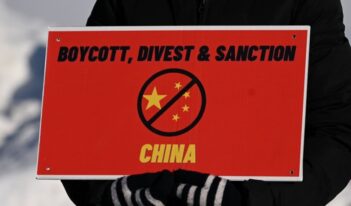
Economists show that the Chinese household registration system restricts economic mobility for rural migrants.
For anyone who has ever quit a job, packed up, and moved to a new city, it may come as a surprise that individuals living in the most populous country in the world—China—enjoy no guaranteed right to relocate. In that country, government officials have instituted a household registration system, known as Hukou, that places significant limitations on domestic migration.
The Hukou system places particular burdens on Chinese citizens seeking to move from rural communities to urban areas, according to a working paper released in 2020. In the paper, three economists show that the disparities in educational opportunity caused by the Hukou system cement wealth inequalities between rural migrants and urban residents, despite the sizable economic contributions of the migrant population to every major city in China.
The economists—Holger Sieg of the University of Pennsylvania, Chamna Yoon of the Korea Advanced Institute of Science and Technology, and Jipeng Zhang of Southwestern University of Finance and Economics—explain that the Hukou system requires all Chinese citizens to register their place of residence at birth. To change their registered place of residence, they must first obtain a special permit from their city’s local police department.
Although the Hukou system was formally established by China’s central government in 1958 when Mao Zedong issued the Hukou Registration Regulation, the administration of the Hukou system has since fallen increasingly on the shoulders of local governments. Because they have broad authority to set their own criteria for permanent Hukou status, local governments have used these powers as a tool to attract high-skilled talent and manage urban growth.
Sieg, Yoon, and Zhang explain that in major cities such as Beijing and Shanghai, citizens confront onerous requirements for changing their Hukou status to permanent resident. Local governments scrutinize everything from an applicant’s total assets to their level of education.
For indigent rural migrants who seek to move to large cities to seek out greater economic opportunity, wealth and educational requirements make attaining permanent Hukou status a chimera.
As a consequence, most rural migrants who move to large cities are stuck with the Hukou status of “temporary” or “transitory” migrant, a status that comes with far fewer privileges than permanent residency. This status restricts a migrant’s access to a wide range of public goods, from health care to unemployment insurance to housing funds.
But chief among these public goods, Sieg, Yoon, and Zhang suggest, is education for migrant children.
Local governments have set up numerous barriers to prevent the children of migrant parents from accessing quality public education. In some jurisdictions, children are prohibited from even participating in college entrance exams.
As a result, Sieg, Yoon, and Zhang find that in major cities such as Beijing and Shanghai, as few as 24 percent of children of low-skilled temporary migrants attend college as compared to 96 percent of children of high-skilled urban residents.
Sieg, Yoon, and Zhang argue that the gross disparity in educational opportunities between rural migrants and urban residents entrenches the existing wealth divide between the two groups. By restricting educational access, the Hukou system also restricts migrants’ access to human capital, stifling intergenerational economic mobility.
The inequity of the Hukou system is even more dramatic, Sieg, Yoon, and Zhang contend, when one considers the enormous positive externalities that migrants contribute to every major city in China.
In particular, Sieg, Yoon, and Zhang find that urban migration represents a substantial driver of housing construction in large Chinese cities. As such, local governments that rely on property taxes have, in large part, rural migrants to thank for a significant portion of their tax revenues.
Recognizing the inequity inherent in the Hukou system, the Chinese central government has attempted to relieve the plight of its rural migrant population in recent years.
Since 2016, the central government has campaigned for permanent residency rights for the 100 million rural migrants currently working and residing in the country’s small and medium-sized cities. Whether those rights will actually be granted rests in the hands of China’s local governments.
Sieg, Yoon, and Zhang remain hopeful, however, and view the issue of rural migrant rights as an economic opportunity for China’s local governments, rather than a liability.
Closing the education gap between urban residents and rural migrants, they argue, not only would alleviate the country’s stark wealth inequalities but would also result in greater economic growth for the country as a whole.



